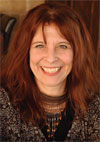|
|
|
The Sacred Feminine, In All Her Magnificence
by Jalaja Bonheim, Ph.D. • Ithaca, NY
Invisible and oppressed- thatís our stereotype image of Arab women. But here I am, leading a retreat in the West Bank for forty Palestinian women who seem every bit as powerful as any of my Western sisters. Most are Muslim, a few are Christian, and the four of us who have come from the US are Jewish.
Since 2005, I’ve led workshops in Israel that unite Jewish, Arab, Druze and Bedouin women in a spirit of peace and healing. But the glaring absence of women from the West Bank and Gaza always saddened me. To enter Israel, they needed permits that were difficult if not impossible to come by.
Then, one of my students offers to organize a retreat in the West Bank. “The women are so hungry for this,” she says. “And it will be the first healing retreat for Palestinian women in the West Bank.” “You mean the first ever?” I ask. She nods. “Yes. Of course there have been peace workshops and discussion groups, but nothing focused on empowering women. And they need it so much.”
Perhaps, but will they come? We aren’t sure. Arab women are typically expected to serve their families and put their own needs on the back burner. How will they justify the extravagance of dedicating an entire weekend to their personal well-being? But we’re in for a surprise. Within short order, we have more applicants than we can handle. After planning for twenty women, we finally have to close the doors at 40.
The day of the workshop dawns. As the women greet me, the first thing that strikes me is the range of their attire. Rania, with her tight jeans, short, spiky black hair and multiple piercings, would surely look at home in any hip New York café. Aisha, on the other hand, arrives shrouded from head to toe in black, with just a small slit through which her dark eyes survey the world.
At first, some of my Western friends feel scared of her. One of them says, “When I saw that black shroud walk in the door, my gut just clenched with terror.” But we soon recognize just how distorted our preconceived views are. Aisha, we discover, is a strong, intelligent and compassionate woman. Deeply religious, she prays five times a day, spreading her little prayer rug in a corner of our coffee room. And yet, there is nothing fanatic about her. Tolerant and open-minded, she turns out to be Reiki practitioner. And at the end of the weekend, she thanks us with a radiant smile for having connected her with such a wonderful and diverse group of women.
I open the circle by asking each woman to explain the meaning of her name. Names hold power, I tell them. And as they share their names—Fragrant Flower, Worthy of Love, Lovely as a Date palm—their faces begin to light up with smiles.
Cranking up the volume on my little iPod system, I am thrilled to discover that they love to dance. Old and young shake their hips with abandon, with nary a trace of inhibition or embarrassment. In some ways, I realize, they are less oppressed than we, who struggle so hard to accept and love our female bodies.
Later that night, I decide to go out on a limb with an exercise in which I invite them to touch and hold each other. Most of them have just met for the first time. Moreover, I have no idea how they feel about physical touch. Are they ready to open to such a deep level of intimacy?
It appears they are. I’m surprised at how quickly the talking and giggling subsides and how quiet the room grows. They’ve paired up now, and are sitting on the floor. One is leaning back against her partner, who in turn is leaning against the wall. It’s a scene I will never forget: Pairs of women, head scarves removed to reveal dark hair. Eyes closed, faces soft and peaceful, as if each had discovered a well of pure sweetness within herself.
Speaking softly, I invite them to imagine that the woman they’re holding is their beloved daughter. “Offer her the love that you would want all women in the world to feel,” I say. “And you, who are being held, give yourself permission to fully receive this woman’s caring and concern.”
Illumined by the light of candles, tears glisten on long dark eyelashes. Elderly grandmothers are holding young women and vice versa. I feel like we’re on a magic carpet, sailing beyond time and space into a realm of exquisite tenderness. Here, before my eyes, is the sacred feminine, in all her magnificence.
I tell the women that in my view, the empowerment of women is an essential key to peace, not only in the Middle East but around the world. Women have tremendous power, and are increasingly ready to embrace their role as leaders and change-makers. They nod in agreement, and as the circle draws to a close, a young physician says, “For me, the most important thing that happened this weekend is that we realized our worth and became proud of being women.”
It’s not easy to leave these amazing women who have shared their stories with so much courage and honesty. Majida holds my hand. “Please,” she says, “Come back. We need this.”
“I would love to,” I respond, adding, as they have taught me, “Inshallah − God willing.”

Jalaja Bonheim, Ph.D., is the author of several books including Aphrodite’s Daughters and The Hunger for Ecstasy. She trains women worldwide to lead circle gatherings as a tool for empowerment and peacemaking and is the founder and director of the Institute for Circlework. For more information, please visit www.jalajabonheim.com and www.instituteforcirclework.org.
|

